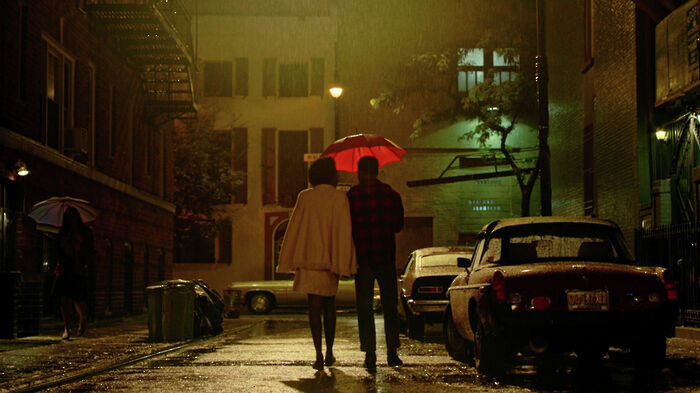Down the rabbit hole and Under the Silver Lake
Megan Harding attempts to unpick the wild fun of David Robert Mitchell’s follow-up to It Follows.

Directed by David Robert Mitchell
Starring Andrew Garfield, Riley Keough, Riki Lindhome
Released 15 March
David Robert Mitchell’s follow-up to 2014’s streamlined anxiety-horror It Follows, Under the Silver Lake is a deliberately bloated homage to old Hollywood, the hard-boiled detective fiction of Raymond Chandler, and, most potently, an onscreen send-up of modern-day objectification and consumer culture.
These themes walk an uneasy balancing act between successful satire and bathetic parody, represented in scenes replete with self-aware visual referencing: our main character Sam (Andrew Garfield) spends a lot of time watching old silent movies in an apartment decorated with posters of classic film noir. Much like Mia’s wall-to-ceiling shrine to Ingrid Bergman in La La Land, Under the Silver Lake makes it clear that it is a movie constructed from movies, within movies, and within the obsessive celebrity culture that has shaped Hollywood today. Robert Mitchell’s film even shares locations and an eye for saturated colour grading with La La Land, but the comparisons stop there.
Instead, what Robert Mitchell does with this picture-perfect map of LA is deconstruct, warp, and mutate it step by step in increasingly bizarre and unbelievable fashion. An amateur conspiracy theorist, Sam decodes secret messages from a Christian band’s song lyrics, old cereal boxes, and retro Nintendo magazines. This sprawling mystery shares the same kind of goofiness as 2016’s The Nice Guys, but lacks Shane Black’s comedy signposting, leaving us in a quandary – do we take Sam’s quest seriously, or should we watch it with a kind of irony, seeing the ridiculousness of it all?

That’s not to say, however, that I didn’t thoroughly enjoy being along for the ride. Arguably the film’s most impressive feature is its score, composed by Disasterpeace (stage name of Richard Vreeland) who returns after his work on It Follows. Sweeping, ambient, and perfectly over-the-top, Vreeland gives weight to the pure absurdity, finding a wry humour in moments that could otherwise bomb while also puncturing the most eerie moments of near-horror with equally disconcerting sound – one indication, at least, that Robert Mitchell knew exactly what kind of a down-the-rabbit-hole, batshit crazy movie he was making.
What struck me most repeatedly throughout this film is a budding critical eye towards the way society treats women. It’s clear that Sam’s obsession with missing woman Sarah (Riley Keough) is wholly unwarranted, having spied on her at the pool and spent all of two hours in her company before leaving after one kiss. To then attempt to both find and avenge her as determinedly as he does feels creepy, and Robert Mitchell seems to enjoy piquing this portrayal of Sam as a true danger in an early scene of him attacking two young boys on the street. This kind of violence, however, motivated by feelings of emasculation and impotence, is swiftly replaced with cartoonish and hallucinatory gore, and although it makes for unpredictable viewing, there is less at stake.
When Under the Silver Lake does try to be politically shrewd, it is often through a well-worn lens: women are objects, performance pieces, pictures in a magazine. Sam is a self-righteous ‘nice guy’ in a society with an equally dehumanising vision of women. But Robert Mitchell doesn’t attempt to upend this narrative with any exploration of why these women are, or agree to be, trapped – in an underground bunker, no less.
Under the Silver Lake crafts a subversive and Lynchian contemplation of Hollywood riddled with secrets and corruption. While its imagery is often powerfully insane, stark and original, it’s not always clear whether it is going to wrap up into a satisfyingly cogent whole. What it does, however, is polarise: much like mother! and Suspiria before it, Under the Silver Lake manages to entice and repulse people in equal measure in a time where critical response to movies is drying up in its conformity. Whether people like it or not, I appreciate bigger studios and companies’ willingness to greenlight a project whose success is not an imminent guarantee, although if Robert Mitchell’s aim was to shock and confound, we must admit that succeed he has.
 News / Cambridge academics stand out in King’s 2026 Honours List2 January 2026
News / Cambridge academics stand out in King’s 2026 Honours List2 January 2026 Interviews / You don’t need to peak at Cambridge, says Robin Harding31 December 2025
Interviews / You don’t need to peak at Cambridge, says Robin Harding31 December 2025 Comment / What happened to men at Cambridge?31 December 2025
Comment / What happened to men at Cambridge?31 December 2025 Features / “It’s a momentary expression of rage”: reforming democracy from Cambridge4 January 2026
Features / “It’s a momentary expression of rage”: reforming democracy from Cambridge4 January 2026 News / Varsity’s biggest stories of 202531 December 2025
News / Varsity’s biggest stories of 202531 December 2025










